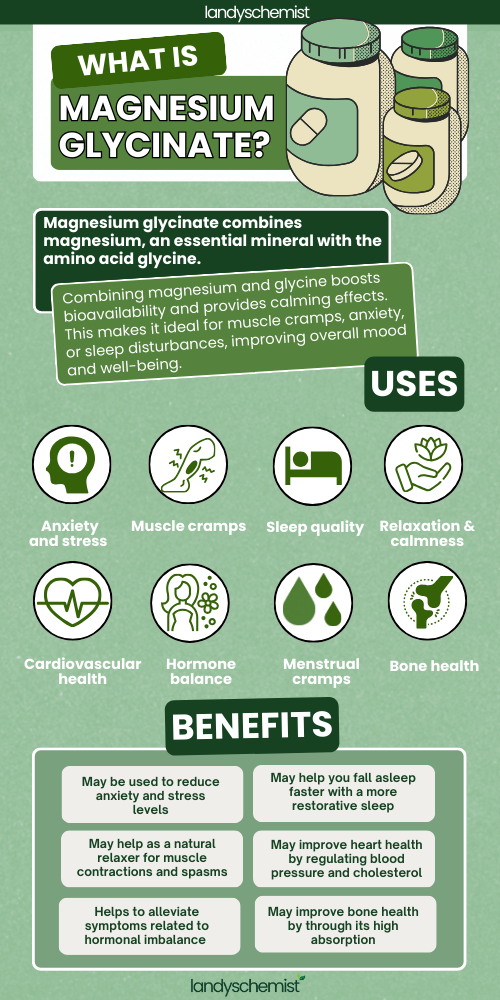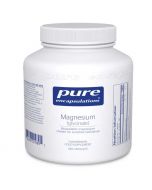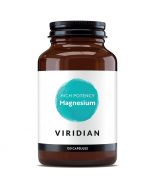
Magnesium glycinate: uses, benefits, dosage
What is Magnesium Glycinate?
Magnesium glycinate, a dietary supplement compound that combines magnesium, an essential mineral, with glycine, an amino acid pivotal as a building block of proteins and in various biological processes, offers a unique synergy.
Glycine, functioning as a neurotransmitter, contributes to relaxation and improved sleep quality by calming the nervous system and reducing anxiety. Meanwhile, magnesium plays a crucial role in vital bodily functions such as muscle and nerve function, bone health, and blood sugar and blood pressure regulation. The combination of magnesium and glycine results in heightened bioavailability, ensuring easy absorption to where the body needs it the most, while concurrently delivering calming and relaxing effects. This makes it an ideal choice for addressing conditions like muscle cramps, anxiety, or sleep disturbances, where both elements work in harmony to enhance overall well-being.

What is magnesium glycinate good for?
When trying to determine whether magnesium glycinate is the better form of magnesium for you, it is important to consider what health concerns or specific benefits you are seeking from a magnesium supplement you want to take. When compared to other magnesium formulations, magnesium glycinate is works particularly well for:
- Muscle Cramps and Soreness
- Stress and Anxiety
- Lowering cortisol levels
- Improving Sleep Quality
- Bone Health
- Blood Pressure Regulation
- Blood Sugar Control
- Migraine Prevention
- Nerve Function
Benefits of Magnesium Glycinate:
Gentle on the stomach
Magnesium glycinate supplements are known to be much more gentle on the stomach compared to other forms of magnesium. A study found that magnesium glycinate supplementation resulted in no reports of diarrhoea, which can be a common problem with other forms of magnesium.
Managing the body's response to stress and anxiety
In stressful situations, the need for magnesium rises for the body to manage it. When a body is deficient in magnesium, it can impact heart health and increase vulnerability to cardiac damage caused by stress. Therefore, maintaining adequate magnesium levels is crucial to support the body's response to stress, ensuring proper cardiovascular function and reducing the risk of related complications. Furthermore, inadequate magnesium levels can impair the body's ability to manage stress, potentially leading to elevated cortisol production (the body's stress hormone). High cortisol levels, in turn, can exacerbate stress and anxiety, creating a vicious cycle. This signifies that stress itself can lead to magnesium deficiency, and magnesium is needed to manage stress.
A review on glycine highlights its ability to enhance the quality of sleep, improve wellbeing, and support neurological functions. Moreover, a study published in the Journal of Medical Biochemistry found that long-term magnesium supplementation in a student population, prone to a lack of sleep and heightened stress levels, showed a significant decrease in cortisol levels, whilst other studies found that it can be used to treat insomnia and sleep efficiency. This supports the use of magnesium glycinate to seamlessly support the body's response to stress.
Lowering cardiovascular disease and blood pressure
The relationship between magnesium intake and cardiovascular diseases is continuously being studied. A review found that high magnesium supplementation was associated with lower cardiovascular risk factors mainly metabolic syndromes, diabetes, and hypertension. Magnesium can also potentially enhance insulin sensitivity and decrease insulin resistance.
Research examines the ability of glycine to significantly lower high blood pressure in individuals with metabolic syndromes. Assessments have also discovered that glycine is genetically associated with metabolic disorders in patients with lower coronary heart disease risk and diabetes which may be partly driven by blood pressure.
Therefore, the combination found in magnesium glycinate could be a valuable supplementation for individuals looking to lower their risk of cardiovascular disease.
Neurological function and muscle cramps
Glycine plays important roles in the brain by controlling signals between nerve cells. It acts as a calming messenger, slowing down brain activity. Glycine also works with other chemicals to regulate nerve cell communication. Researchers are studying how glycine moves in and out of cells, as understanding this process could help in conditions like muscle tone problems, epilepsy, schizophrenia, pain, and brain disorders. Correspondingly, magnesium plays a significant role in reducing pain sensitivity. It works by blocking specific receptors related to pain signals. Researchers have explored its benefits in various painful conditions like surgery recovery, nerve pain, headaches, and menstrual pain.
Together, magnesium and glycine offer a comprehensive approach to support both neurological health and alleviate muscle cramps.
How much Magnesium glycinate should I take?
A general and safe dosage of magnesium glycinate per day is between 250mg-500mg. We strongly advise against exceeding a daily dosage of 800mg to maintain safety and avoid potential adverse effects.
Side Effects:
Magnesium glycinate supplementation is generally considered safe when taken as directed. Unlike some other forms of magnesium, it is gentle on the stomach and is less likely to cause diarrhea, a common side effect associated with magnesium supplements. However, as with any supplement, individuals may experience mild side effects such as upset stomach, nausea, or diarrhea, particularly if taken in excessive amounts.
Recommended Magnesium Glycinate Supplement
We recommend Pure Encapsulations magnesium glycinate for its outstanding features tailored to diverse needs. Each capsule provides an ideal, adjustable dosage of 240mg, allowing for precise supplementation based on individual requirements. Free from common allergens, binders, fillers, and unnecessary ingredients, it ensures purity and safety. Furthermore, its vegan-friendly composition aligns with various dietary preferences.
Summary:
- Highly bioavailable: Magnesium glycinate, combining magnesium and glycine, offers heightened bioavailability, ensuring easy absorption, perfect for individuals with sensitive stomachs.
- Versatility in Health Support: Magnesium glycinate is particularly effective for managing muscle cramps, stress, anxiety, and sleep disturbances. It aids in stress response by reducing cortisol levels, supports neurological functions, and helps alleviate pain sensitivity, making it a versatile solution for various health concerns.
- Cardiovascular and Blood Pressure Health: Magnesium glycinate's potential in lowering cardiovascular disease risk is backed by research, linking magnesium intake with reduced risk factors like metabolic syndromes, diabetes, and hypertension. Additionally, glycine's impact on blood pressure makes magnesium glycinate valuable for individuals aiming to lower their cardiovascular disease risk.
References
- https://pubmed.ncbi.nlm.nih.gov/25533534/
- https://faseb.onlinelibrary.wiley.com/doi/10.1096/fasebj.27.1_supplement.lb291
- https://pubmed.ncbi.nlm.nih.gov/7836621/
- https://www.ncbi.nlm.nih.gov/books/NBK507250/
- https://www.mdpi.com/2072-6643/12/12/3672
- https://scindeks.ceon.rs/article.aspx?artid=1452-82581403291Z
- https://bmccomplementmedtherapies.biomedcentral.com/articles/10.1186/s12906-021-03297-z
- https://pubmed.ncbi.nlm.nih.gov/23853635/
- https://pubmed.ncbi.nlm.nih.gov/28337245/
- https://www.ncbi.nlm.nih.gov/pmc/articles/PMC5852744/
- https://pubmed.ncbi.nlm.nih.gov/16444815/
- https://www.ncbi.nlm.nih.gov/pmc/articles/PMC6400990/
- https://www.ncbi.nlm.nih.gov/pmc/articles/PMC5350494/
- https://pubmed.ncbi.nlm.nih.gov/14612155/
Rhysa Phommachanh










